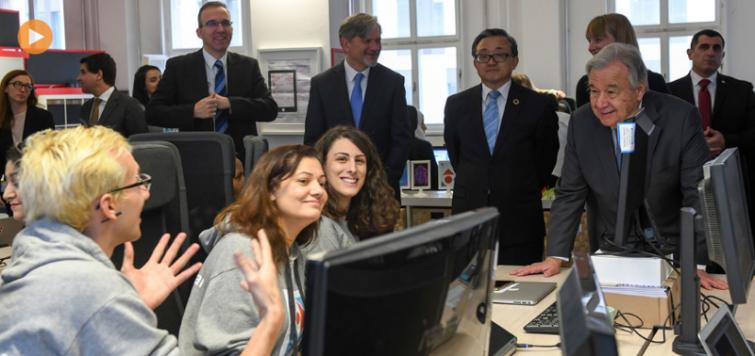December 30, 2025 05:19 pm (IST)

Guterres underscores UN role in achieving a free, secure Internet
New York/IBNS: Unless countries work together to address gaps in digital access, as well as related social and political divisions, this generation will be remembered as the one that “ruined the early promise of the Internet”, the UN Secretary-General has warned.
António Guterres was speaking on Tuesday at the Internet Governance Forum taking place in Berlin this week.
“Connecting all the world’s people by 2030 must be our shared priority, not only for sustainable development, but for gender equality”, he said, highlighting the role of the Internet in achieving a more equitable future.
With this year marking the 30th anniversary of the Berlin Wall being torn down, the UN chief expressed frustration that “not only are we still building physical walls to separate people, but that there is also a tendency to create some virtual walls in the Internet, also to separate people.”
The only solution, he said, is a future with “one world, one net, one vision.”
Intersecting ‘divides’
However, the Secretary-General said the goal of an accessible, free, secure and open Internet is at risk of fracturing along what he sees as three intersecting lines: the digital divide, a social divide, and a political divide.
Globally, some 3.6 billion people do not have affordable Internet access, he reported. Most alarming, this digital divide mainly affects people in the world’s least developed nations, where the Internet could have the most transformative impact.
Meanwhile, the gender gap in connectivity continues to widen, he added.
“Worldwide, some 327 million fewer women than men have a smartphone and can access the mobile Internet. Women are also drastically under-represented in information and communications technology jobs, top management and academic careers in the technological sector. And 90 per cent of start-ups seeking venture capital have been founded by men.”
Furthermore, given the polarizing nature of much content online, Mr. Guterres said the digital divide can “aggravate” social divisions.
Trapped in online ‘echo chambers’
“My belief is that the Internet can be a powerful force for good, but we are seeing also that it is a tool that can easily be put to nefarious use. The algorithms that determine social media can trap us in the echo chambers of our own opinions and prejudices,” he said.
The UN chief remarked that political discourse and society at large are being influenced by an “as-yet largely unregulated industry of social media providers”, while artificial intelligence is being used to manipulate voters, track human rights defenders and stifle dissent.
“We also need to understand the relationship between digital advances and inequality,” he added. “We know that inequality and exclusion drive social unrest and conflict. We also know that digital technologies, depending on their use, can be a force that widens social gaps or reduces them.”
Turning to what he considers the “potentially most dangerous divide”, the Secretary-General underlined the threat the political divide poses to trade, security and Internet systems.
Cyber-conflict between States happening now
“You are all familiar with the politics surrounding 5G technologies. You are also aware of the growing efforts of some States to construct ever harder borders in cyberspace, on the one hand, and the ever-increasing number of cross-border cyber-attacks, on the other. Low-intensity cyber-conflict between major States is not a future prediction but a feature of our present time”, he stated.
Guterres called for collective action to combat these potential dangers, warning that “If we do not work together to address these divides, we will be remembered as the generation that ruined the early promise of the Internet.”
UN provides platform
In this regard, the Secretary-General highlighted the UN as the “appropriate platform” to address these global challenges.
He urged participants at the Forum to share policy expertise and to agree on some basic common principles, among other recommendations.
He also encouraged them to explore the possibility of establishing a Global Commitment on Digital Trust and Security, as recommended by his High-level Panel on Digital Cooperation, launched last year, to agree on global norms for cyberspace.
Guterres announced that he will soon appoint a Technology Envoy who will help nurture a shared digital future which puts people first, as well as helping bridge divisions.
Support Our Journalism
We cannot do without you.. your contribution supports unbiased journalism
IBNS is not driven by any ism- not wokeism, not racism, not skewed secularism, not hyper right-wing or left liberal ideals, nor by any hardline religious beliefs or hyper nationalism. We want to serve you good old objective news, as they are. We do not judge or preach. We let people decide for themselves. We only try to present factual and well-sourced news.
Support objective journalism for a small contribution.
Latest Headlines
German Red Cross faces sharp donation decline in 2025 amid inflation, donor fatigue
Sat, Dec 27 2025
Libyan general's fatal Turkey plane crash: Black box heads to Germany for neutral analysis
Sat, Dec 27 2025
No German boots in Gaza—for now: Berlin rules out joining peace force as war drags on
Sat, Dec 27 2025
Christmas horror in Paris: Knife attack leaves three women injured, suspect arrested
Sat, Dec 27 2025
Zelenskyy to meet Trump in Florida as US-led peace talks with Russia enter critical phase
Fri, Dec 26 2025
Israeli reservist soldier dismissed after ramming ATV into praying Palestinian in West Bank
Fri, Dec 26 2025







